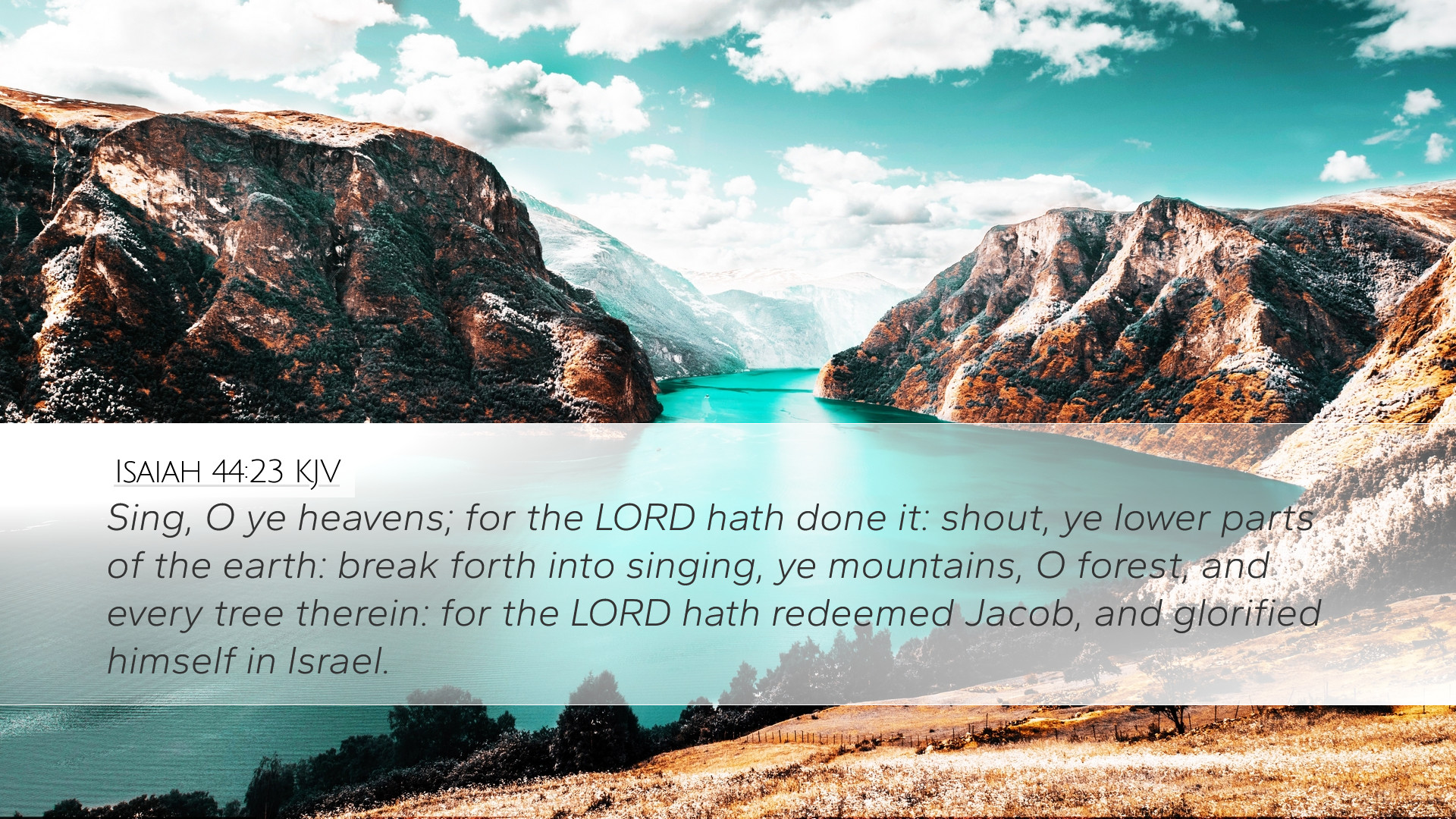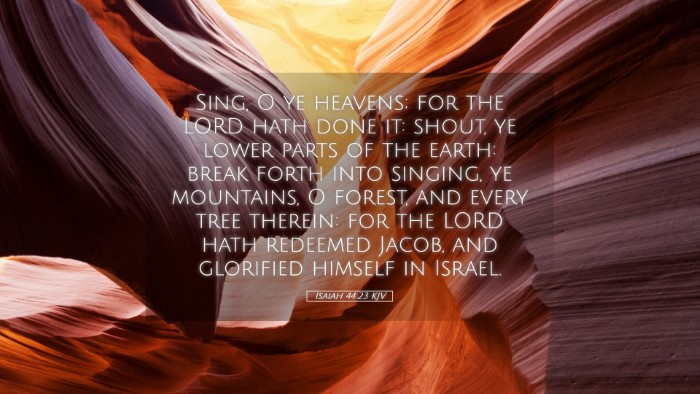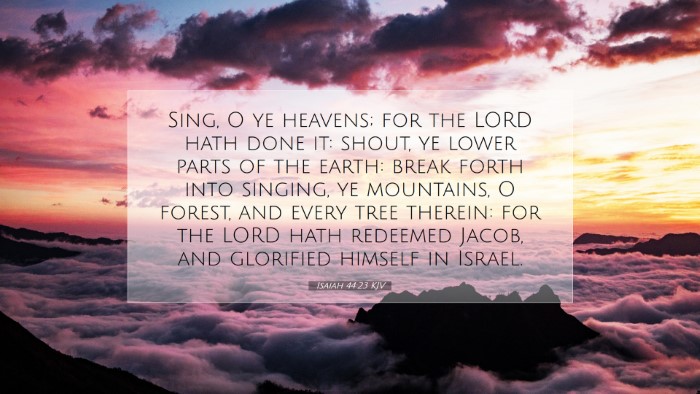Commentary on Isaiah 44:23
Bible Verse: "Sing, O ye heavens; for the Lord hath done it: shout, ye lower parts of the earth: break forth into singing, ye mountains, O forest, and every tree therein: for the Lord hath redeemed Jacob, and glorified himself in Israel." (Isaiah 44:23)
Introduction
This verse presents a powerful declaration of God's redemptive work and invites creation itself to respond with joy. The tone is one of triumph, as the prophet Isaiah calls on all of nature to recognize and celebrate what God has accomplished for His people. In examining this verse, we will draw upon insights from noted public domain commentators such as Matthew Henry, Albert Barnes, and Adam Clarke.
Theological Themes
At the heart of Isaiah 44:23 are several theological themes that resonate deeply within the Christian faith:
- Redemption: God's promise to redeem His people, which signifies His commitment to restore and deliver them.
- Creation's Response: The call for creation to join in worship underscores the connection between the Creator and His creation.
- Divine Glory: God's act of redemption not only benefits His people but serves to glorify Him, demonstrating His power and faithfulness.
Exegesis of the Verse
This section provides a breakdown of the verse's elements, offering a deeper understanding of the text:
- "Sing, O ye heavens; for the Lord hath done it": This opening call to the heavens indicates that God's acts are not confined to Israel alone. Matthew Henry emphasizes that the heavens symbolize the entire creation, which reflects God's glory.
- "Shout, ye lower parts of the earth": The lower parts, including the earth, can be understood as a representation of the global creation. Albert Barnes notes that this invocation signifies the comprehensive scope of God's work.
- "Break forth into singing, ye mountains, O forest, and every tree therein": Here, Isaiah asks the mountains and trees to join in praise. Adam Clarke elaborates on how nature, often overlooked, plays a significant role in praising the Creator.
- "For the Lord hath redeemed Jacob, and glorified himself in Israel": The reason for celebration is rooted in the redemption of Jacob (Israel), reflecting God's faithfulness. This redemption is not only personal but communal, emphasizing God's covenant with His people.
Insights from Commentators
Each commentator provides unique insights into this verse, enhancing its understanding for pastors, students, and scholars alike:
Matthew Henry
Henry posits that the joy reflected in this verse arises from the fulfillment of God’s promises. He explains that singing and rejoicing are fitting responses to God’s work of redemption. Henry highlights that this verse serves as a call not only for Israel but also for the entire creation to recognize and celebrate God’s sovereignty.
Albert Barnes
Barnes emphasizes the comprehensive nature of God's redemption. He notes that the invitation to the heavens and the earth indicates that God's saving acts extend beyond Israel. Barnes further interprets the singing and shouting as expressions of joy not just on earth but throughout the cosmos, showcasing what he calls a "universal acknowledgment" of God’s greatness.
Adam Clarke
Clarke elaborates on the idea that nature itself is a witness to God’s glory and redeeming acts. He argues that the mountains and forests symbolize stability and life, respectively, and their participation in praise signifies a restoration of harmony within creation. Clarke also highlights the significance of redemption as a reason for creation's joyous response, linking it to God’s character as a redeemer.
Practical Applications
The implications of Isaiah 44:23 can be profound for modern readers. Here are some practical applications:
- Worship as a Response: Believers are called to respond to God's deeds not only through singing but through every aspect of life. This challenges congregations to consider how they can bring glory to God in daily living.
- Recognition of Redemption: Understanding the depth of God’s redemption encourages gratitude and deeper faith among believers. It serves as a reminder of the transformative power of God’s love.
- Creation Care: The call for creation to rejoice can prompt discussions on environmental stewardship among faith communities, aligning their practices with the biblical call to care for the earth.
Conclusion
Isaiah 44:23 stands as a triumphant declaration of God’s redemptive power and a call for all creation to rejoice. Drawing from the insights of Matthew Henry, Albert Barnes, and Adam Clarke, we see how this passage not only speaks of the historical context of Israel’s redemption but extends a broader invitation to recognize and respond to the glory of God. For pastors, students, and theologians, this verse offers deep theological reflections and practical applications that resonate throughout the centuries and continue to inspire worship and praise today.


